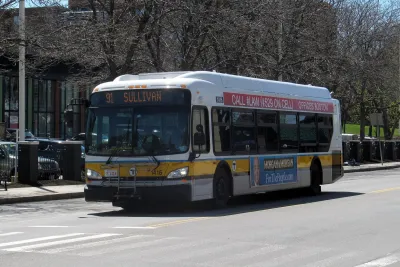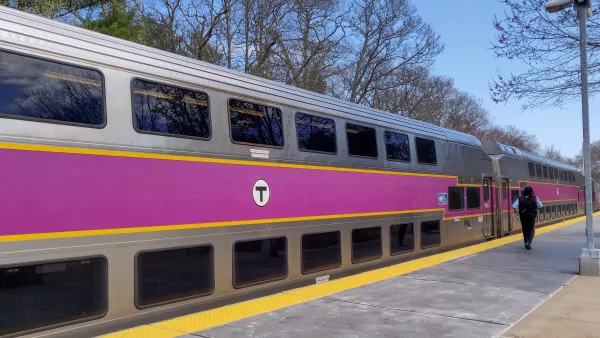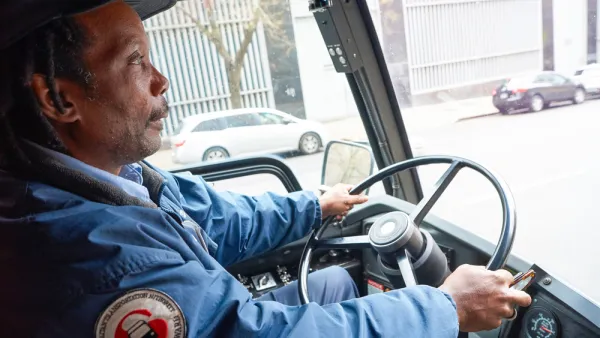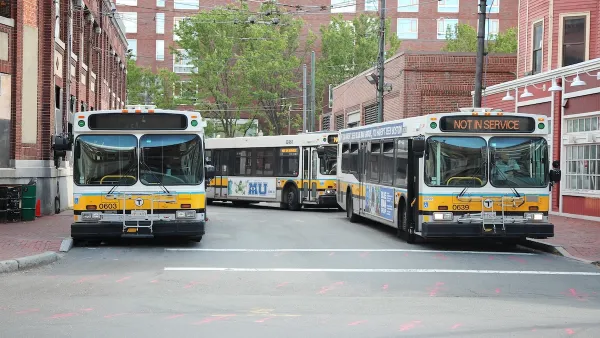The bus lanes have improved travel times, but who should cover the costs isn't entirely clear.

Adam Vaccaro reports that a bus-only lane started last year is significantly speeding up buses traveling on Washington Street. Both the city and the Massachusetts Bay Transportation Authority agree that the lane is a success and an improvement that can be widely used in the region.
"But it has also raised a tough question: Who is responsible for managing these additions to the roads — the state-run transit agency that owns the buses or the city that owns the streets?" says Vaccaro.
The city is suggesting that the MBTA should help support the next phase of the project by covering expenses such as signage and paint for the lanes. While costs normally are the responsibility of a city or town, Boston pays more to the MBTA through assessments than any other municipality.
"Activists see this as the kind of typical Boston-area jurisdictional dispute that threatens to slow adoption of a transportation improvement at a critical time," reports Vaccaro. Still, bus lanes are faring well, and both state and local officials are heralding them as a cost-effective solution for tackling regional traffic problems.
While the issue of financial contributions remains up in the air, more lanes are are on the horizon, reports Vaccaro:
The [Marty] Walsh administration plans to hire the city’s first-ever transit director to work directly with the T on planning and implementing bus lanes, as well as other staffers to monitor them on a daily basis. City officials said that they expect to discuss the issue with new MBTA general manager Steve Poftak — whose appointment was praised by Walsh — who started the job this week.
MBTA officials say they are working with the city to resolve the issue, and advocates say they would like to see a signed agreement between the agency and the city.
FULL STORY: Boston’s new bus-only lanes are an improvement. But who will pay for them?

Analysis: Cybertruck Fatality Rate Far Exceeds That of Ford Pinto
The Tesla Cybertruck was recalled seven times last year.

National Parks Layoffs Will Cause Communities to Lose Billions
Thousands of essential park workers were laid off this week, just before the busy spring break season.

Retro-silient?: America’s First “Eco-burb,” The Woodlands Turns 50
A master-planned community north of Houston offers lessons on green infrastructure and resilient design, but falls short of its founder’s lofty affordability and walkability goals.

Test News Post 1
This is a summary

Analysis: Cybertruck Fatality Rate Far Exceeds That of Ford Pinto
The Tesla Cybertruck was recalled seven times last year.

Test News Headline 46
Test for the image on the front page.
Urban Design for Planners 1: Software Tools
This six-course series explores essential urban design concepts using open source software and equips planners with the tools they need to participate fully in the urban design process.
Planning for Universal Design
Learn the tools for implementing Universal Design in planning regulations.
EMC Planning Group, Inc.
Planetizen
Planetizen
Mpact (formerly Rail~Volution)
Great Falls Development Authority, Inc.
HUDs Office of Policy Development and Research
NYU Wagner Graduate School of Public Service




























